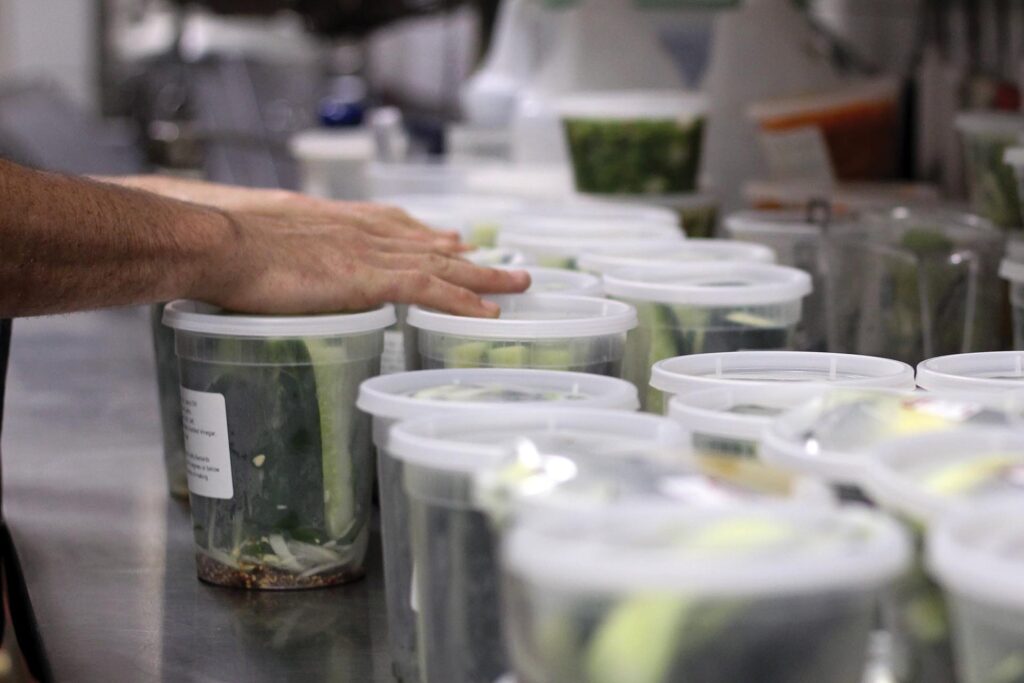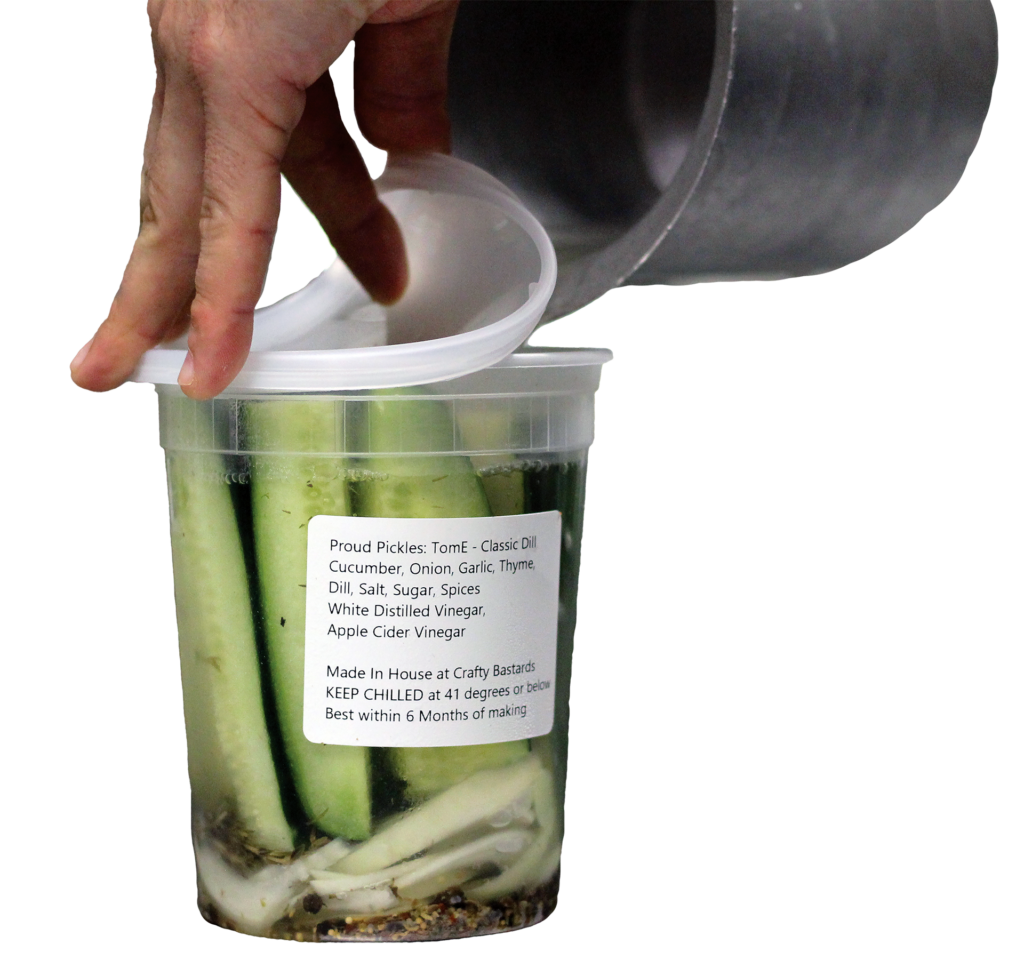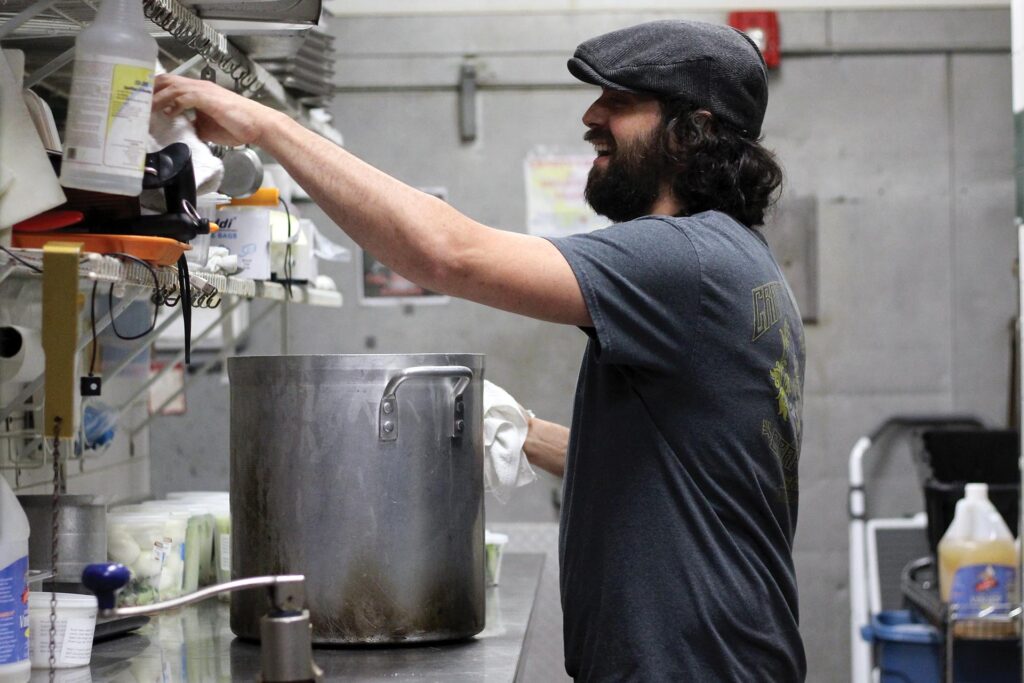Do you want to try some pickles?
Turning talent into business

February 5, 2024 | story and photos by Alissa Gary
This story is from Atrium’s Winter 2024 magazine, which released December 2024.
Some pucker their lips and scrunch their noses. Others take the shot stone-faced, smacking their mouths to absorb the aftertaste.
No customer at Grove Street Farmers Market could pass Elijah “Fish” Gurman’s booth without being heckled into taking a shot of diced pickles.
The 34-year-old owner of Proud Pickles stood at the helm of his farmers market booth with about 70 sample cups at his fingertips. Each of the 10 coolers he brought to the market was filled with plastic containers of pickles.

“You wanna try some pickles?” Fish yelled at the nearest passersby, more statement than question.
They shook their heads and smiled at first, politely declining the invitation. But Fish waved them over until they shuffled toward the booth.
He calls the method aggressive generosity — “like a clingy ex,” he said as he handed the customers a sample cup of white pickled cauliflower.
“I have a lot of people who tell me they don’t like pickles,” Fish said. “They’re all full of shit.”
He’s worked in restaurants since he was 13, cooking his way through big cities and Michelin-star restaurants. But the blight of fast-paced kitchens and the big egos running them led him to return to his hometown of Gainesville to focus on something simpler: cucumbers, garlic and vinegar.
His small-business story is not unusual. Just last year, 600,000 Floridians filed business applications with the U.S. Chamber of Commerce — the third-highest rate in the country. Fish said grinding for success is “fairly common.”
“But then again,” he added, “maybe I’m just downplaying how awesome I am.”
His company, Proud Pickles, was a pandemic-era effort to make rent. In 2020, when a restaurant he worked at temporarily closed, he gathered what he knew about fermentation and started designing recipes.
More than 50 pickle flavors and vegetable combinations make up his menu. It’s meant to have something for everybody — there’s classic dill but also radishes with bean sprouts, ginger with pineapple and green papaya with scallions.
Fish keeps at least one container of each flavor available at any time, he said, just in case somebody wants to buy it. But the menu is too broad for even Fish to manage inside the back kitchen of Crafty Bastards, the northwest Gainesville restaurant in which he operates.
On a Monday at 8:30 a.m., a few brown curls peeked out from beneath Fish’s green pickle-themed beanie as he bent over a cutting board. He slid a radish against a mandolin, the millimeter-thick circlets emerging in an orderly stack, his fingers a second away from getting caught in the blade. His hands moved by muscle memory from over a decade in food service.
The radish joined diced onions, bean sprouts and thyme in a plastic container. He covered them in pickle brine and made his way to a walk-in refrigerator hidden behind a display fridge. Fish’s radish mixture settled on top of a set of containers labeled “Rad Sprouts.”
“It seems a little chaotic,” he said, “but there’s a system of some sort.”
But the hundreds of pickles aren’t enough to make ends meet.
Fish spends afternoons in the same restaurant bartending, serving and marketing for the pub. He runs a bounce house company with his brothers on the weekends. Altogether, a usual workday for Fish runs from dawn to dusk, seven days a week.
Florida has the fourth-highest ratio of restaurant cooks to other professions in the nation, according to the Bureau of Labor Statistics. That’s about one cook in every 77 people.
Cooks in Florida make about $16.30 an hour, just about matching the national average. Yet, it’s about $6 short of sustaining a single adult without children, according to estimates collected by the Massachusetts Institute of Technology.
Fish recommends nobody go into food service today.
So why hasn’t he left the business?
“Because I’m dumb,” he said. “I just enjoy what I’m doing.”
His father was a general manager at Applebee’s and other chain restaurants, so it was natural for him to follow the food path, he said. He took his first restaurant job just before high school.

After graduating from Eastside High School’s culinary arts program, he moved to Miami in 2007 to attend a culinary school that has since closed its South Florida campus. He and his younger brother shared an apartment and worked at the same restaurant, a South Beach hotel and bar called Eden.
Four years and a bachelor’s degree later, he thought about leaving Miami to pursue his longtime dream of moving to New York City.
Only two weeks passed between Fish’s first mention of moving to the city and when he left, said Joseph Gurman, his younger brother and roommate. That summer in 2012, Fish packed his life into his car and said goodbye to his brother.
“If he says he’s going to do something, he’s going to do it,” Joseph, 32, said. “I just didn’t expect it to happen so early.”
Spring was turning to summer in New York City. Fish’s white Jeep Cherokee, which he said was “hanging on by a thread,” successfully made the 24-hour drive up from Miami. He had a job lined up at a high-end restaurant thanks to a friend of a friend. But only when he parked in Jersey City, he said, did he realize he had nowhere to live, so he resorted to sleeping in the car. It took two days to find an apartment.
Fish worked at about seven restaurants during the seven years he lived in New York, most of which were fine dining spots in the city. His first was at Aureole, a Michelin-star restaurant in the middle of Times Square.
It was rare for Fish to take a night off. When he twisted his ankle at an after-hours soccer game, he hopped down the stairs to the kitchen instead of missing work. Hot oil regularly dripped from the pans he pulled out of the oven, littering his arms in raw, blistering burns.
“I wore them as a sense of pride for a long time,” he said.
But as he grew older, Fish said he felt like his bosses didn’t care about his well-being, certainly not to the same degree that he cared about their restaurants. The fast-paced New York scene had started to wear him down.
At his brothers’ urging, Fish moved back to Gainesville in 2019.
He hesitated at first. Having learned so much about fine dining in the big city, he told his brothers that returning to Gainesville felt like being a big fish in a small pond — prompting them to mockingly call him Big Fish.
The nickname stuck.

Fish took a front-of-house job at Crafty Bastards upon moving home. Gainesville’s food scene, Fish said, is less intense than New York’s, but its product is just as high in quality.
Thinking through decisions wasn’t Fish’s forte until later adulthood, he admitted. He wasn’t nervous about moving to Miami, nor to New York, nor about starting Proud Pickles. But as the company has gotten more popular, he’s looking to expand: He just bought a friend’s trailer, which he’s transforming into a mobile pickle-selling unit.
He’s more worried for the future than he’s ever been.
“With the dreams of bigger things, and bigger projects and bigger responsibilities,” he said, “comes the knowledge that I’m not that person.”
But three weeks later, he clarified: That’s just the “insecure bullshit” talking. He knows he can achieve his Proud Pickles dreams, starting by better managing his money. It just doesn’t happen overnight.
Fish is also happier than he’s ever been. If he had to define success — though he doesn’t think much about it, he said — it would be by his happiness.
“It’s not a monetary thing,” he said. “It’s like, ‘What do I get out of this?’”
He recently joined a team to develop a new food accessibility program in the historically Black Porters neighborhood. The issue of food waste became close to Fish’s heart after he opened Proud Pickles. Throwing away food is like throwing away money and time, he said.
“Don’t get rid of the juice,” he told a customer at Grove Street Farmers Market as they bought a pint of spicy dills. “The whole jar is meant to be used up.”
With each pickle jar he sold, Fish reminded customers that pickle juice can be repurposed as salad dressing or meat seasoning. He saves each radish tip in a plastic container for salad, and his menu features a piña colada horchata made from pineapple skins that would have otherwise ended up in the landfill.
Chase Kilpatrick has been working at the Proud Pickles stand for five months. In his short pickle tenure, the 17-year-old has also learned to appreciate all parts of the vegetable. He preached the value of making pickles from discarded cauliflower leaves, Fish nodding approvingly from the sidelines.
Pickle juice dribbled down Chase’s arm as he refilled the four sample cups wedged between his fingers and handed them out in the rain.
“I end up showering, and I still smell like pickles,” he said. “It’s good for me, bad for my mother.”
In a profession where Fish so often felt overworked and undervalued by superiors, he sought to do the opposite for Chase. He thanked the teen for handling a last-minute customer.
“If someone treats you well,” Fish said, “you should treat them well back.”
A personality test once told Fish he was a nurturing person. In the back kitchen of Crafty Bastards, he weighed a tub of salt before dumping it into a pot of pickle brine big enough to fit a toddler. His ankle-high socks were mismatched. A pen stuck out from behind his ear.
Lots of people like to cook. Yet few start every day at 8 a.m. and finish past 10 p.m., just to serve their hard work on a platter to strangers.
Fish grabbed a freshly made jar of dill pickles and glanced at its label. He knows there’s a demand for quality products. It’s just a matter of creating them.